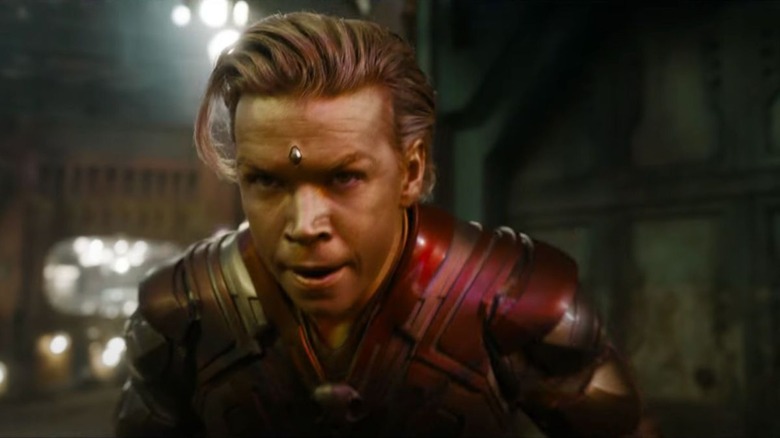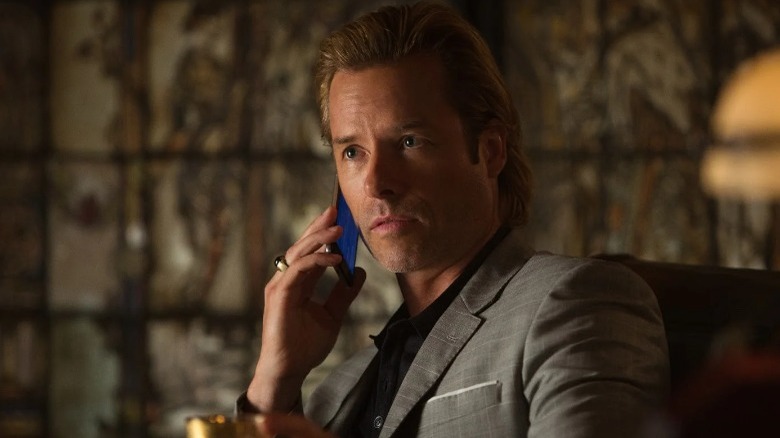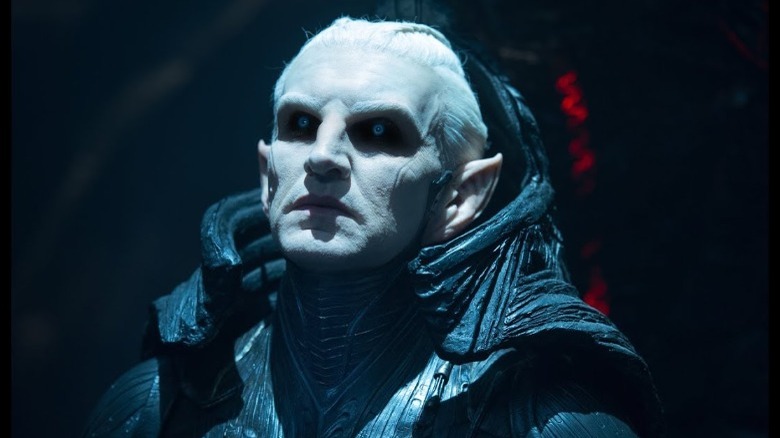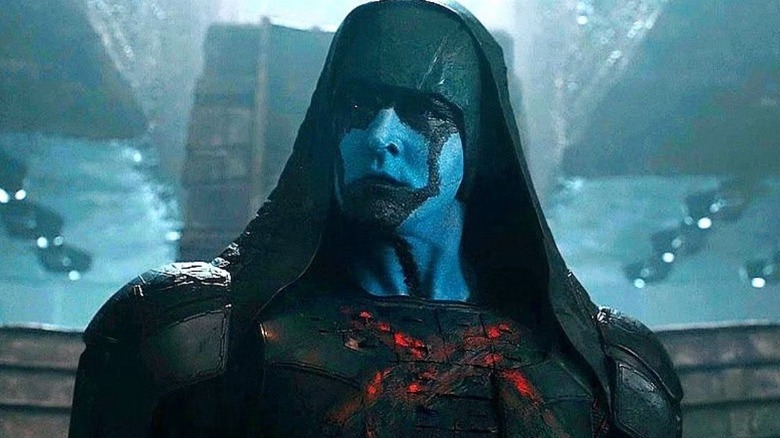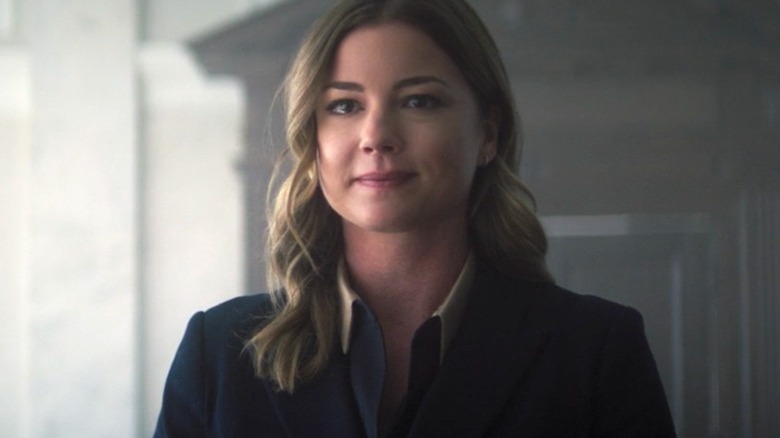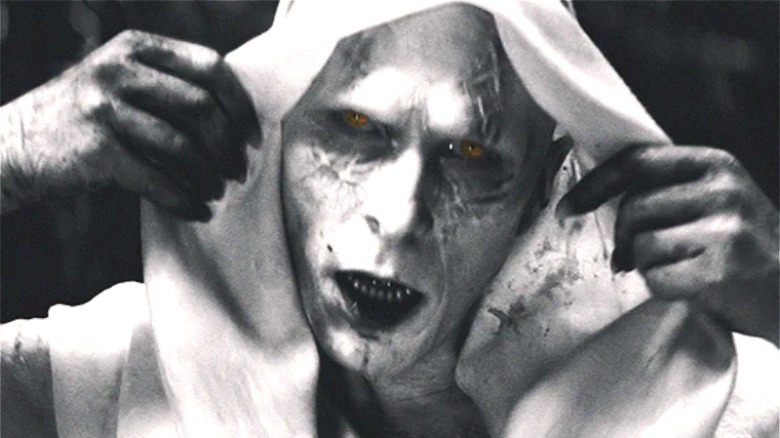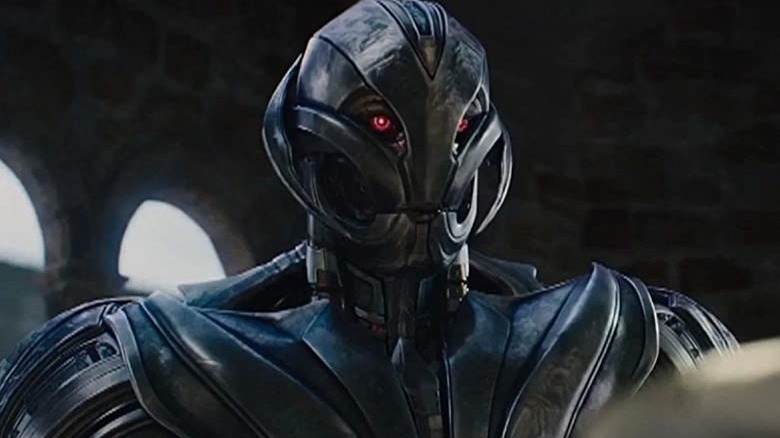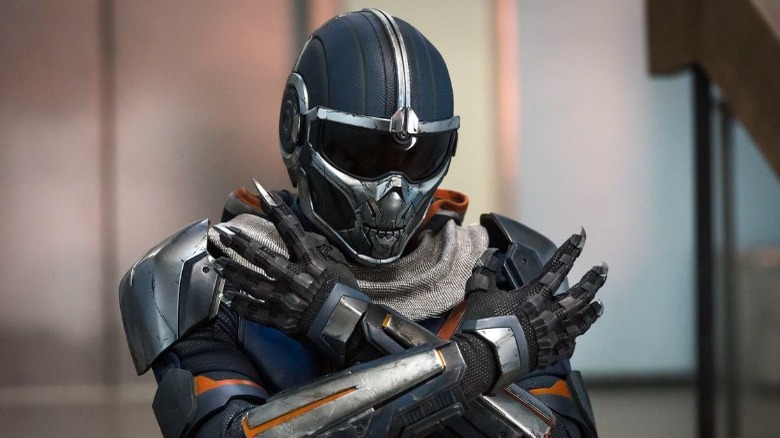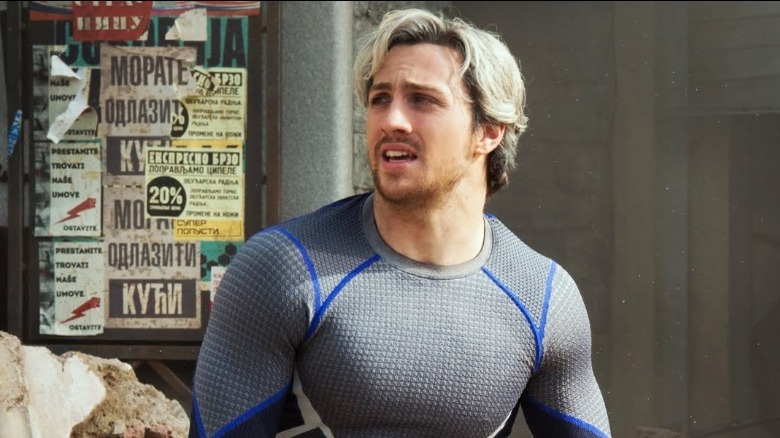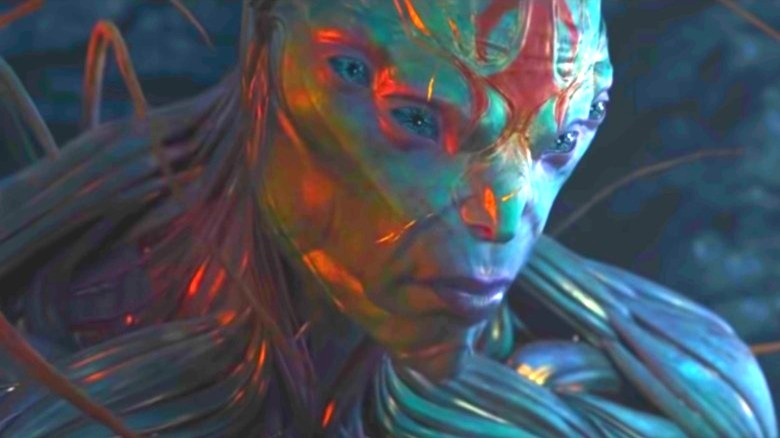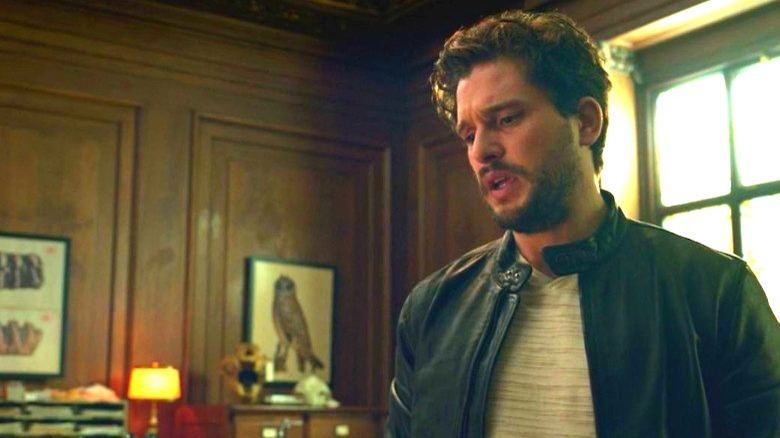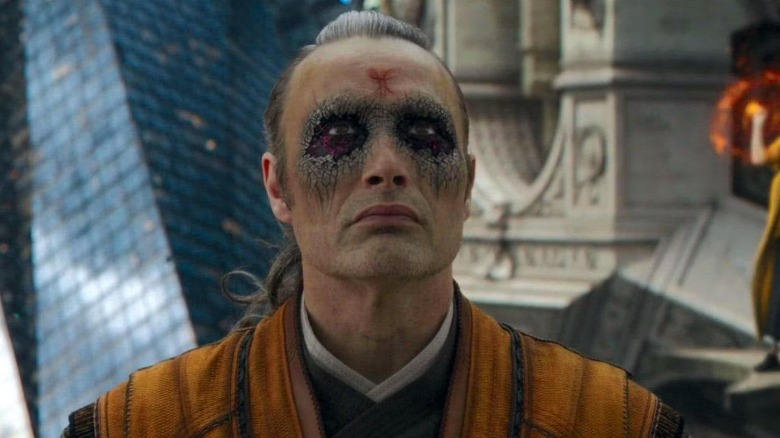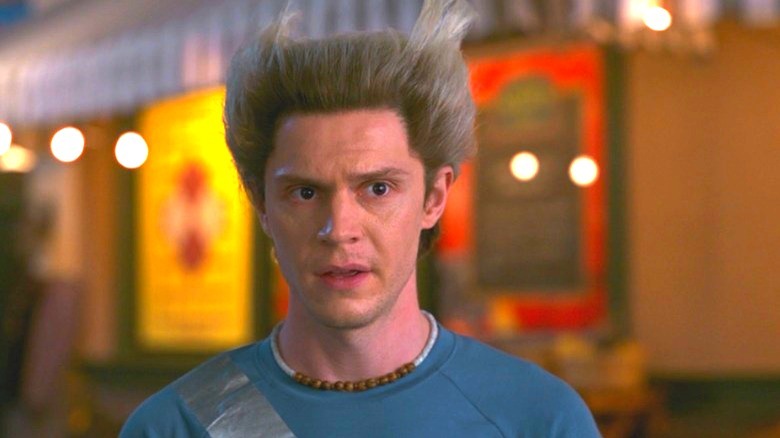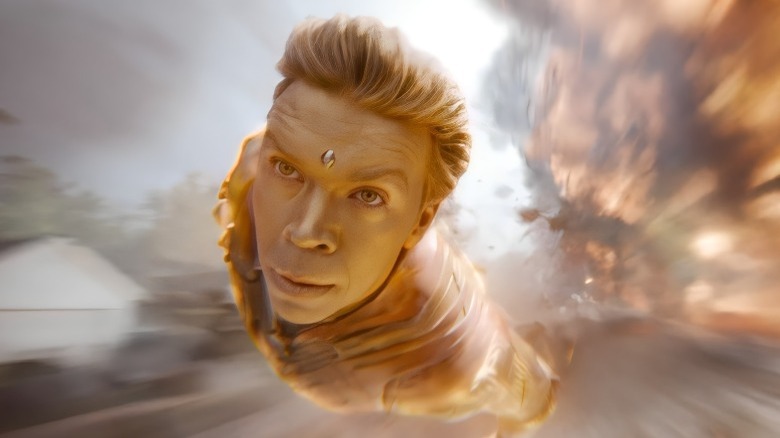MCU Characters Who Turned Out To Be Huge Disappointments
While the comic book source material is always close to the Marvel Cinematic Universe's heart, the movies aren't afraid to pave their own way through one of the publisher's many classic stories. Along with changes to plots we thought we knew, new versions of old friends and foes pop up on the big and small screens — and the results of these transformations aren't always what we expected.
Most of the time, the changes are refreshing, giving us a new view of a character that might've been first introduced in the 1970s, like Starfox, allowing them an opportunity to reboot some seriously dated morals. Or they introduce someone almost totally new, like Scarlet Scarab, to bring in a viewpoint that's never had the representation it deserved. But sometimes, the results are controversial, leading fans to argue that the MCU dropped the ball. It's a conflict that arises around villains the most, as the change of medium from long-running comics to one-and-done flicks can turn a great enemy into something too disposable to honor their significant achievements. But they're not the only victims of being done dirty in the minds of fans. It's a problem that has also turned a few heroes into zeros.
The Mandarin aka Aldrich Killian
We want to specify that the man behind the man in the ugly duckling movie that is "Iron Man 3" is the problem. Trevor Slattery (Sir Ben Kingsley) was just a guy in silk robes, filming terrorist speeches with all the heavy-handed gusto of a Shudder scream queen; for his efforts, he's found himself in some great new storylines (such as the "Wonder Man" series on Disney+). But Aldrich Killian (Guy Pearce), a scientific mastermind with a slick glow-up after a tropey "ugly" origin with bad hair and glasses, didn't nail the leap to the big screen.
To be fair to Killian, he's not the worst would-be tech scumlord in the MCU. Elon Musk has a cameo in "Iron Man 2," and look where we are today. But compared to the tight political and technological thriller of the Warren Ellis and Adi Granov "Extremis" comic storyline, Killian is little more than an annoying stalker gone bad. Tony Stark (Robert Downey Jr.) gets a great plot thread about coping with his PTSD, but Killian is a forgettable antagonist, wasted in a bizarre third-act death that resembles something from the later "X-Men" movies. He's less interesting than his comic book counterpart, who kills himself in his first appearance. Yikes.
If you or anyone you know is having suicidal thoughts, please call the National Suicide Prevention Lifeline by dialing 988 or by calling 1-800-273-TALK (8255).
Malekith the Accursed
Christopher Eccleston is a gift from the working man's class of English actors. As the Ninth Doctor, he brought a steady but cheery charm to the acclaimed revival of "Doctor Who," proving Eccleston's worth as a performer who always deserves our time. Giving him a meaty villain's role in the fledgling MCU should've been a win for everyone. Unfortunately, the early MCU was a fractious era, and his big day out as Dark Elf antagonist Malekith the Accursed in "Thor: The Dark World" turned into a hot mess.
Malekith is a comic book mainstay, a terrifically complicated villain who was raised as a slave, trained as a wizard, and has fine reasons to loathe Asgard. His malice and ability put him on par with Loki when he appears, and it's a bitter irony that it's the MCU Loki's damn near insurmountable charisma that sidelines Malekith's movie version. Among all the other troubles that derailed "The Dark World," from the loss of its original director to Creative Committee meddling, Tom Hiddleston is this film's curse and salvation. By upping Loki's role to patch over the movie's plot problems, Malekith turns into the MCU's first "that guy" — a villain that deserved a whole lot more than what he was given. At least we got to see a leather-clad Loki in chains. Sorry, Mr. Eccleston.
Ronan the Accuser
The Worf Effect is the name of a trope movie fans will instantly recognize. It's when a well-established tough guy gets rag-dolled to prove how cool the new villain on the block is. Ronan the Accuser (Lee Pace) gets his moment when he kills Thanos' PR guy, known as The Other, (Alexis Denisof) right in front of him. It's a great moment, one that's built on how much The Other forced Loki towards his horrific acts in "The Avengers." Unfortunately, it's pretty much the only one Ronan gets in "Guardians of the Galaxy."
The apex of Kree cruelty and fascism looks scary as hell in his ritual armor, wielding a hammer so large that a "Warhammer" Ork would respect it. He's beefy enough to handle an Infinity Stone without ill effects, and the problem isn't that he's taken out by a jackass in a dance-off. It's that he gets a mere eight minutes of screentime to establish himself as a threat worth remembering. It's not enough. Frustratingly, he makes an appearance in "Captain Marvel" that suggests he wants to come back and be a whole new problem for Carol Danvers, but unless the multiverse — and the Kree-Skrull conflict — causes some cool stuff real soon, that's a job that's going to be left to his replacement, Dar-Benn (Zawe Ashton).
Sharon Carter
The cry heard around the world as the final credits rolled on "The Falcon and the Winter Soldier" was, "Sharon Carter is really a Skrull, right?" Please, there's still time to help her. Peggy Carter's great-niece, Sharon (Emily VanCamp), was one of SHIELD's most competent agents, a career woman whose life was derailed by both Hydra and the civil war that breaks out when the Superhero Registration Act is signed into law. It's understandable that Carter would feel betrayed by her homeland and go dark after that. But her 180 turn into the cold-blooded Power Broker is a lot for fans to take in. Too much, really.
Sharon Carter, and by extension Peggy (Haley Atwell), are characters women look up to. They've earned their place through hard work and dedication, proving their abilities over and over to guys who don't get it. Turning Sharon into a traitorous girlboss, an apex white woman richly ensconced in a troubled Asian city-state, isn't fun. We've got enough "role models" like that in real life, like Theranos founder Elizabeth Holmes. Save our Sharon, Marvel. Bring her home when the "Secret Invasion" winds down.
Gorr the God Butcher
When Christian Bale signs onto a role, movie fans know what they're going to get. Bale is understandably easing back on the wildest methods he has of disappearing into a character, as stunts like starving himself out for "The Machinist" aren't wise to repeat, but that hasn't changed his work's quality. As Gorr the God Butcher, a magnificent addition to Thor's rogues' gallery, the worst Bale should've had to deal with is the make-up trailer. That gives him plenty of room to become one of the best villains the MCU could want.
Instead, he gets short-shrift in a rare semi-bad movie from director Taika Waititi, a film that's so choppy you can smell the pile of footage that was left on the cutting room floor. Gorr is still a refreshing Marvel villain in "Thor: Love and Thunder," a presence so looming and emotional that we immediately crave more of him on the screen. But as annoyed fans love to point out, Gorr butchers precisely one god on-screen, and never gets to truly earn the poignant ending he enjoys. Yes, it's another dead villain, embodied by one of the best actors in the industry, chucked out with the baby and the bathwater.
Ultron
Ultron (James Spader) didn't suffer from a lack of screen presence in "Avengers: Age of Ultron." His threatening voice and capability were bang on, building on the darkest parts of Tony Stark's identity and taking his programmed duties to a horrifying, but logical, extreme. The issue? His "age," synonymous with era, measures hours. Worse, the impact he leaves doesn't rely on remembering him at all.
The comic event "Age of Ultron," by Brian Michael Bendis and Bryan Hitch, spanned multiple timelines over its 10-issue run, including a full year's worth of comic tie-ins. It showed a world long since beaten into submission, with the heroes so desperate to fix matters that they're willing to invest in the "time travel to kill Hitler" plan. Only here, Ultron's creator is Hank Pym, not Stark. Fans knew early on that the MCU's "Age of Ultron" was going to do something new with the title, and on the bright side, it was a way to bring Vision into the MCU. But the final results are still underwhelming, discarding Ultron and setting up later events with the questionable efficiency of a slap-chop. While 'What If" gives us a better look at Ultron's potential, it's still another failure of the MCU villain machine.
Taskmaster
Far be it from us to offer the guys that cry about gender-swapping minor characters any space to latch onto, but the changes "Black Widow" made to Taskmaster, the battle-ready mimic who can take on any Avenger himself, didn't add much to their importance in their first big screen outing. Taskmaster's identity is a secret at first. Eventually, fans discover that Anthony Masters, mercenary and military instructor, is now Antonia Dreykov, the brainwashed and weaponized daughter of the man behind the Widow project.
It's clearly meant to underline the potent themes of "Black Widow," which addresses the real-world commodification of women at the whims of powerful men. It's a problem always worth talking about, because it's, unfortunately, endlessly relevant to us. But by making Taskmaster into yet another victim of this bloody machine, a borderline fridged woman whose torturous life isn't fun for female fans to watch, we lose a chance at a confident, capable female villain. On the bright side, she'll be a member of the Thunderbolts, which means the new Taskmaster has a chance to become a truly fearsome figure in the MCU.
Quicksilver
Magneto's mutant twins always come as a matched set, a fact that's been used to edgy intent in the "Ultimates" universe. Bringing Wanda and Pietro Maximoff to the MCU before the film rights to the "X-Men" characters could be settled meant zero chance of an Ian McKellen or Michael Fassbender cameo, much less a confirmed connection. On the bright side, Wanda (Elizabeth Olsen) and Pietro (Aaron Taylor-Johnson) had immediate sibling chemistry, making them the pair to watch as they manipulated the Avengers on behalf of Ultron.
This makes Pietro's death in the third act of "Age of Ultron" one of the most nonsensical decisions the MCU has ever made. An argument exists that it helped the movies speedrun Wanda's connection to Vision, followed by the shattering of her psyche. It's not a great argument, because, with a little time to breathe, Pietro could've been a terrific long-term addition to the franchise. Mouthy and arrogant, but intensely loyal, he's the foil Hawkeye (Jeremy Renner) needed to help build more of his own personality. Watching the two of them become frenemies wouldn't have rendered Clint Barton's solo outing redundant, either. It would have added more ties for Hawkeye to care about. Pietro's death didn't add the value the MCU thought it would, and the one time they teased a possible return, well, that turned into a mess, too.
The Deviant Kro
It's easy to forget there was another antagonist in "Eternals." The Deviant threat was a vague plot thrown into the film to give this group of immortal guardians a reason to keep evolving their relationships over the centuries. Once the Deviants become an active threat in modern times, their leader, Kro (Bill Skarsgard), threatens to become interesting, with an emotional connection to Thena (Angelina Jolie) and a demand for his own right to continue to exist as an evolved being.
Kro is overshadowed by the machinations of Ikaris (Richard Madden), however. When confronted about the truth of the purposes of Deviants, Eternals, and their Celestial creators, Ikaris decides he doesn't care all that much about life on this planet and uses the Deviants to do his dirty work. Kro dies when there's an internecine scrum between Eternals, over a vague notion of revenge and the fact that eating Eternals ... or something ... helps the Deviants evolve towards a fully sapient state. Catch all that? Even if you watched the movie, you probably didn't. It's a lovely film overall, with beautiful cinematography, but Kro's presence still remains a pointless riddle.
Dane Whitman aka the Black Knight
Dane Whitman, known to comic fans as the occasional Avenger and descendant of King Arthur, is in "Eternals" for some reason. Played by Kit Harrington (a good actor and a nice dude who didn't deserve to be the heart of those "muh queen!" memes that sprang up after the disastrous finale of "Game of Thrones"), his job in "Eternals" is to, we think, white knight after Sersi (Gemma Chan) as she tries to figure out her own heart. His reward is getting forcibly ghosted by cosmic forces, along with a credit cookie that reveals his signature cursed sword and suggests that he knows the famous dhampir and vampire hunter Blade (Mahershala Ali).
None of that posits an actual future plotline for Dane. If he's in "Blade" and his story so much as threatens to overshadow Eric Brooks' own, there will be a well-deserved riot in the fandom. If he's not, why was he introduced this way? At this point, the best route might be to shovel him into a Medieval Times-themed Special Presentation to give him some actual character work. Then maybe the MCU can bring him back to the group playground.
Kaecilius
Mads Mikkelsen is the guy Hollywood hires when they need an expertly compelling performance. He channeled his "Star Wars" fandom to make us care about a doomed dad in 30 seconds flat in "Rogue One." He performed in a Rihanna video because it mattered to his kids. He probably barely thinks about "Casino Royale" most days but boy, we do. And fans got a chance to have him in the MCU. Unfortunately, "Doctor Strange" gives him a role that's somehow more pointless than poor Malekith.
A far cry from the comic book Kaecilius, who served Baron Mordo with feral dedication, the MCU's Kaecilius is a stewpot character — meaning he was cobbled together from pieces of other nobody villains – whose job is to get rag-dolled when the real heavies show up. For this, they hired Mikkelsen. He gets one banger line during his battle banter with Strange, a few thematic one-offs, and then pft. Exit Mikkelsen, stage left. The only bright side is, it's such a small role that the MCU could recast him in something else. He'd be a great Victor von Doom, for example. Give Mikkelsen another chance. He deserves it, and so do we.
Ralph Bohner
Some of us had a good laugh over getting our chains yanked by the chance to slip the Fox continuity's Pietro Maximoff (Evan Peters) into the MCU, courtesy of Wanda's reality-warping antics in "WandaVision." It's a relatively sly gag, a meta-joke that shows the MCU does understand what the loss of Pietro did to Wanda, and acknowledges that, in terms of showing off his ability, the Foxverse Quicksilver was a treat to watch.
Unfortunately for hopeful fans, this long-form dick joke also rests on the corpse of the already badly abused MCU Pietro. Ralph Bohner is just some local guy Agatha Harkness (Kathryn Hahn) enchanted into being her useful idiot. The only time he gets into a Quicksilver costume is for the Halloween episode, looking hilariously terrible. On the whole, it's a disappointment that's meant to be a disappointment — we're sharing in Wanda's pain that we desperately wanted this man to be her brother. But he's not, he never can be, and there's still no hint of Wanda's real brother coming back into her life. Her trauma was too "important" to let her have a moment of hope.
Adam Warlock
The outcry against the version of Adam Warlock (Will Poulter) that we meet in "Guardians of the Galaxy Vol. 3" is understandable. Adam Warlock is one of Marvel's heavy hitters, a literal cosmic Jesus whose importance to the saga of the Infinity Stones is the heart — or soul, really — of his existence. But James Gunn's version takes him closer to his origin story instead, which leads plenty of fans to feel that he's already wasted in the greater MCU.
Adam, like his comic forebear, is a freshly hatched newborn when he first appears in the movie. He's a kid without a moral center and an eagerness to do what his parental figures want him to do. But at least he starts off with an identity, which is more than his ancestor did when he was simply He. It's a nice parallel that Warlock still learns who he is via the High Evolutionary, but that's not much of a salve for those who know he could've added plenty of deeper thought to the big themes behind this final outing for the Guardians. Fortunately, he has lots of time to grow into his original role as a spiritual advisor, and he might guide fans through some of the philosophical implications of the Marvel universe.
